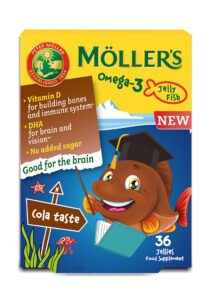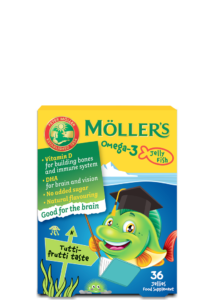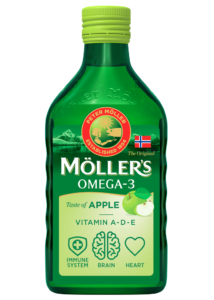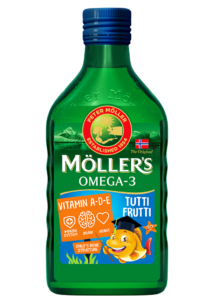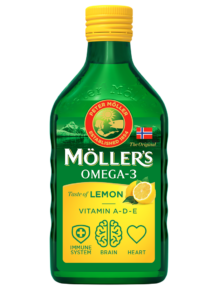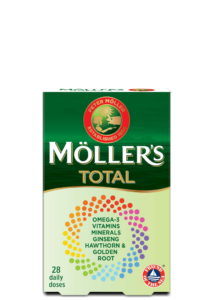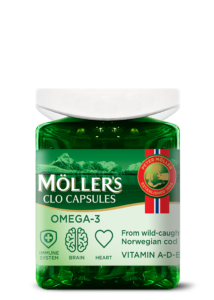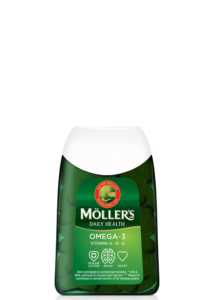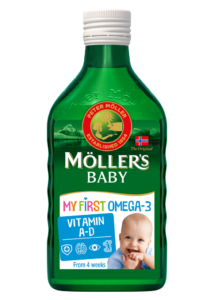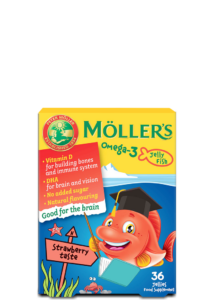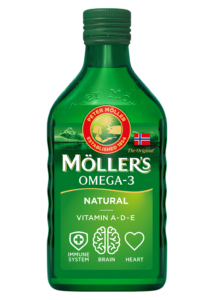Pregnancy is a unique phase in life. Suddenly you’re responsible for another life and you need to think carefully about how you nourish your body. In some cases, you might need supplements.
Home » Pregnant and unsure about supplements?

What should you eat?
Generally, if you eat a healthy and varied diet, the same as the general population, you will get all the nutrients you need. However, while a dietary supplement can’t replace a healthy diet, there are some nutrients you need to make sure you get enough of.
Omega-3 supplements
Your body cannot produce Omega-3 and omega-6 fatty acids efficiently by itself, so this has to be added via your diet or supplements. The beneficial omega-6 fatty acid known as alpha linolenic is found in plant-based oils such as sunflower oil, corn oil and soya oil. Nuts, seeds, grains and cereals, and some vegetables such as avocado, are good sources of omega-6. With a normal diet, you get enough omega-6 fatty acids. Good sources of omega-3 are more limited and the most beneficial omega-3 fatty acids are only found in marine oily sources such as mackerel, herring, salmon and anchovies. Your consumption of the marine omega-3 fatty acid DHA contributes to the normal development of your baby’s brain and eyesight. Consider taking an omega-3 supplement if you eat the less than two portions of oily fish per week recommended by the NHS.
Read more about omega-3 – the vital fat
Vitamin D supplements
You might need an extra supplement of vitamin D. Sources of vitamin D include oily and some milk and dairy products enriched with vitamin D. Your body produces vitamin D when it is exposed to sunlight but this source can be limited in winter in the Northern Hemisphere, where there isn’t as much sunlight for several months of the year or because we stay indoors during the time of the day with the most sunlight. This is why the NHS advises that ” All adults, including pregnant and breastfeeding women, need 10 micrograms of vitamin D a day and should consider taking a supplement containing this amount.”
We need vitamin D in order to absorb and benefit from calcium and phosphorus. Both these minerals are important for maintaining your own skeletal system as well as developing the skeletal system of your baby. Your body’s requirement for calcium increases slightly during pregnancy.
Read more about vitamins and minerals
Folic acid supplements
Taking folic acid in pregnancy reduces the risk of congenital defects such as spina bifida. This is why the NHS recommends that women take a supplement of 400 micrograms of folic acid starting from when they plan to become pregnant and throughout the first trimester. Good sources of folate (folic acid) are broccoli, kale, Brussels sprouts and spinach, as well as coarse grain products.
Iron supplements
During pregnancy, the blood volume that carries nutrients and waste material for both you and your baby increases. Your requirement for iron, included in the red blood cells, therefore increases. Sources of iron are bread and grain products, meat, beans, lentils, potatoes and green vegetables. Your doctor will measure your iron levels at every consultation throughout your pregnancy to see whether you need an iron supplement.
Iodine supplements
A survey of pregnant British women revealed that 74% consume less than the World Health Organisation (WHO) recommended intake of 250 micrograms of iodine daily. In recent years, there has been a decrease in the intake of milk, yogurt and seafood, all of which are sources of iodine. Iodine is essential to form hormones from the thyroid gland, which in turn are essential for the body’s metabolism and the development of the baby’s brain and nervous system. If you are pregnant or breastfeeding and either consume less than 600 ml of milk or yogurt per day, or eat little to no fish combined with less than 800 ml of milk or yogurt per day, you should consider a dietary supplement of iodine.
What is good health?
Do you have a good lifestyle?
Lifestyle simply means the way in which you live. Health and lifestyle go hand in hand. You might feel you have a good lifestyle if you are physically active, eat healthily and generally experience a sense of wellbeing. Conversely, if you want good health you should also have a good lifestyle.
Physical activity is the major contributor to a good lifestyle, but diet, drugs, stress, sleep and social conditions are also play an important role. Being able to use the body properly to avoid injury also affects lifestyle. Physical activity can also prevent depression and help you to recover more quickly from mental illness, both of which obviously affect your lifestyle.
Diet can be a difficult topic for many. Perhaps you eat too much or too little or maybe you find it hard to know what foods to combine to have a balanced diet. It’s also important to eat food that contains important vitamins, minerals and dietary fibre, omega-3 and antioxidants. On top of all this, you also need to get enough energy, protein and the correct fatty acids. The requirement for these nutrients changes throughout your life. When you are older you also have different requirements than children and younger adults. Women also have different requirements than men. Pregnant and breastfeeding mothers also have special requirements.
When you get older, you lose muscle mass and your body requires less energy and therefore less food. You may lead a less active life than you did before, which is why you require less food. However, your need for minerals, vitamins and other nutrients remains the same. Of course, there are plenty of healthy and active older people, but when you reach 70 to 80 years of age, it’s easier to become ill, especially during flu season.
Some steps you can take to improve your lifestyle and health are to:
- eat a healthy and varied diet
- stay active
- watch your weight
- avoid too much alcohol and don’t smoke
- get enough sleep
- think positive
- practise good hygiene
What is good quality of life?
The World Health Organisation (WHO) defines quality of life as a state where the individual can realise their potential, cope with normal stressful situations, work in a rewarding and positive way, and be able to contribute to others and society.
Quality of life is a wide and somewhat diffuse concept that includes joy in, and a desire for, life. These are values that are rather felt than measured, which in turn are based on personal environment and choices. Quality of life doesn’t necessarily depend on being healthy or sick. It’s the moments between worries, sorrows, problems and ailments that matter. For example, if you have a chronic illness, a feeling of mastery can be important when talking about quality of life.
To sum up, quality of life is a combination of health, lifestyle, networks and social support. It’s about experiencing joy, meaning in life, satisfaction, security and a sense of belonging, as well as being able to use your strengths. It’s also about feeling interest in life, coping with everyday situations and a being committed to something or someone. If you have good quality of life, you will be able to cope better with the inevitable stressful situations in life.
Our products
-
Möller’s Omega-3 Jelly Fish Cola
-
Möller's Omega-3 Jelly Fish Tutti Frutti
-
Möller’s Cod Liver Oil Apple
-
Möller’s Cod Liver Oil Tutti Frutti
-
Möller’s Cod Liver Oil Lemon
-
Möller's Total
-
Möller's Cod liver oil capsules
-
Möller’s Daily Health
-
Möller's My First Omega-3
-
Möller’s Omega-3 Jelly Fish Strawberry
-
Möller’s Cod Liver Oil Natural
Learn more
Exercise program for the elderly
Healthy Aging Healthy Bones
Healthy diet during pregnancy
Brain Healthy Aging
Good health, lifestyle and quality of life – What does it all mean?
Cod Liver Oil Healthy Aging
Get inspiration on our Instagram
